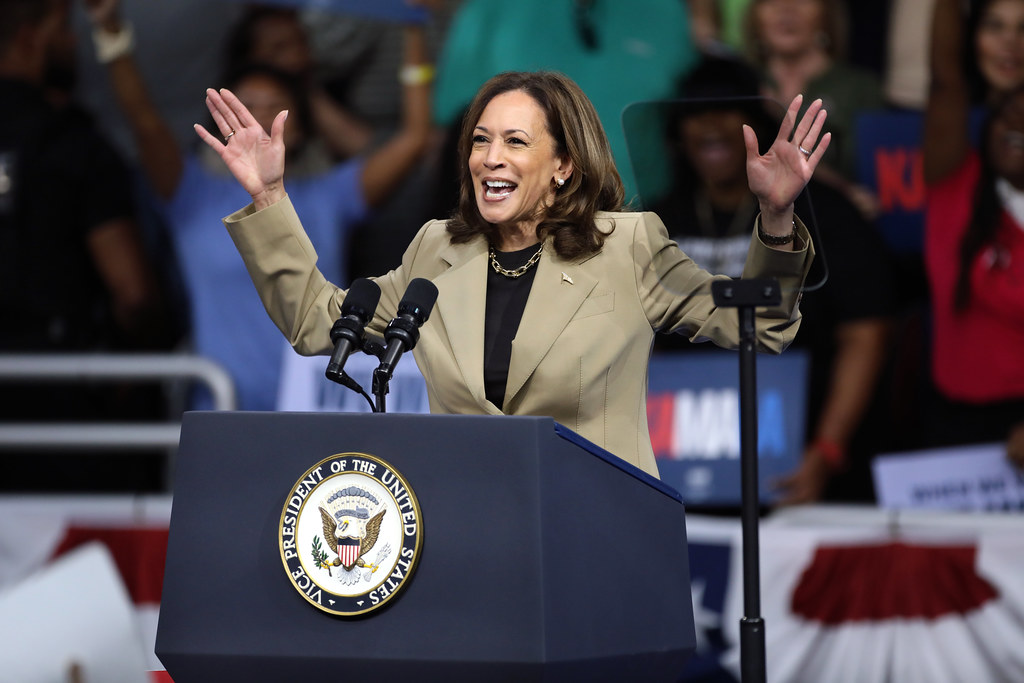After the results of the 2024 presidential election poured in, millions of Americans were shocked to see Democratic presidential candidate Kamala Harris lose both the electoral college vote and the popular vote. Despite the polls forecasting a close election, Republican candidate Donald Trump flipped the swing states that voted for President Joe Biden and Harris in 2020. Harris’ loss can be attributed to flaws in her own campaign.
Besides disadvantages such as starting the campaign three months before the election and the challenge of running as the first woman of color to lead a major party ticket, Harris’ campaign lacked substantial depth and outreach. The downfalls of her campaign include blatant vagueness, lack of initiative, poor marketing and disrespect of voters’ concerns.
Harris’s vagueness and question dodging is apparent in her interviews. At the National Association of Black Journalists, the interviewer asked about making childcare and eldercare affordable. Harris’ answer used general language to convey abstract benefits and lacked specific policy steps that explained how a plan would be implemented.
After a few more remarks, Harris said that she planned to expand the Child Tax Credit, but even with this information, the response shifted to a slightly different subject and still didn’t provide an in-depth explanation on how it would be achieved.
On “The View” Harris was asked if she would do anything different from Biden’s presidency, which has had low approval ratings since September 2021. “There is nothing that comes to mind,” Harris said. “And I’ve been a part of most of the decisions that have had impact.”
As current vice president, this further connected her to the pitfalls of the Biden administration and ruined her chance to share something different she could bring.
Another issue with Harris’ campaign was that much of the marketing was done online, on Instagram and TikTok page @KamalaHQ, run by a team of young people. While this strategy attracted younger audiences, it created an illusion of support. Interactions may be inflated by robots, underage audiences and foreign supporters, all of whom cannot vote.
In a subtle manner of not relating to the average voter, Harris repeatedly used celebrity endorsements to gain leverage. The opinions of wealthy celebrities like Oprah and Charli XCX did not resonate with working-class Americans. In addition, older audiences likely did not understand what “Kamala is brat” means.
Harris’ poor marketing also bled into her goal of appealing to moderate voters, which was unconvincing and ultimately lost her supporters.
When Harris campaigned alongside former Rep. Liz Cheney and received an endorsement from former Vice President Dick Cheney, it hurt her more than it helped. In relation to Cheney’s endorsement, a source close to Harris commented that “people don’t want to be in a coalition with the devil,” according to Rolling Stone.
Ironically, in her attempts to appeal to everyone, Harris showed no respect for the average American’s biggest concerns, one of them being the ongoing Israel-Hamas conflict.
When protesters confronted Harris at a rally in Michigan, shouting “Kamala, Kamala you can’t hide, we won’t vote for genocide,” Harris responded with “You know what, if you want Donald Trump to win, then say that. Otherwise, I’m speaking.”
Her response was condescending, dismissive and an ignorant move, especially because Michigan was a swing state with a high population of Arab American voters who cared about the conflict. It was another example of how Harris constantly portrayed Trump as the unwanted alternative in her own campaign.
In contrast, as shocking as Trump’s win was, his campaign was strategic. He stood his ground and chose JD Vance, a former Trump critic who has been transparent about his working class background, as his running mate.
He made appearances on podcasts with audiences of mainly men, took photos working at McDonald’s and continued to hold rallies even after two assassination attempts. Regardless of whether it is his true character, Trump’s campaign portrayed him as someone who was loyal to his supporters, believed in the working class and was worthy of redemption.
Harris and her campaign did not act alone. Major figures in the Democratic Party and their supporters have contributed to the Republican Party’s wins in the 2024 elections. Infighting, corruption and patronizing attitudes have plagued the left in recent months. An overall shift to the right in voters across the country was reported.
“It should come as no great surprise that a Democratic Party which has abandoned working class people would find that the working class has abandoned them,” Sen. Bernie Sanders said on X. “Will the big money interests and well-paid consultants who control the Democratic Party learn any real lessons from this disastrous campaign? Will they understand the pain and political alienation that tens of millions of Americans are experiencing?”
It may be easy to pin the loss on Trump supporters, third party voters and undereducated people, but Harris’ campaign holds responsibility as well. The 2024 elections should be a wakeup call for the Democratic Party.







